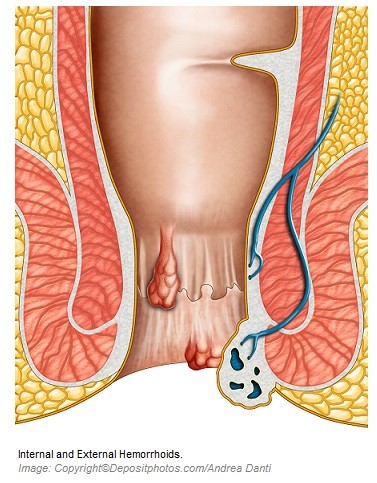 preventing damage to the sphincter muscle. Straining and engorgement lead to protrusion and prolapse of these structures into the anal canal, which is referred to as “hemorrhoids”. In fact, hemorrhoids are anal varicosities.
preventing damage to the sphincter muscle. Straining and engorgement lead to protrusion and prolapse of these structures into the anal canal, which is referred to as “hemorrhoids”. In fact, hemorrhoids are anal varicosities.
Hemorrhoids are usually classified as internal and external. They are often asymptomatic, and when becoming symptomatic, bleeding and protrusion are the most commonly complaints. Pain and itching are less common.
Clinically, hemorrhoids have four stages:
Stage 1: bleeding (usually painless).
Stage 2: prolapse and protrusion during defecation with spontaneous reduction.
Stage 3: prolapse and protrusion requiring manual reduction.
Stage 4: prolapse and protrusion cannot be manually reduced.
Potential contributing factors:
- Old age.
- Increased intra-abdominal pressure:Straining and constipation.
- Pregnancy.
- Physical exertion, such as lifting heavy objects.
- Coughing.
- Sneezing.
- Prostate enlargement.
- Liver cirrhosis.
- Obesity.
- Straining and constipation.
- Dietary factors:
- Low fiber diets.
- Diets high in fats.
- Insufficient water intake.
- Low function thyroid.
Nutritional Supports:
Restricted Foods:
- Saturated and Trans fats. They slow down transit time in the GI tract.
- Sugars and sweets.
- Friend foods.
- Oils.
- Processed foods.
- High protein diets.
- Alcohol.
- Caffeine.
- Caffeinated drinks.
- Carbonated beverages.
- Spicy foods.
- Allergenic foods.
- Dairy products with fat over 1%.
- Crackers.
- Muffins.
- Doughnuts.
Recommended Foods:
- Water: at least 2 – 3 liters a day. Dehydration worsens hemorrhoids.
- Whole gains.
- Foods high in fiber: legumes, avocado, pears, and artichoke.
- Foods high in flavonoids: berries and red grapes. Flavonoids reduce inflammation and strengthen the walls of the veins forming hemorrhoids.
- Nuts.
- Seeds.
- Flaxseeds, chia, and hemp seeds.
- Pineapple..
- Prunes.
- Soaked figs.
- Fruits and vegetables high in mucilage: jujube, aloe vera, chia seeds, flaxseeds, kelp, marshmallow, okra, and psyllium.
- Green leafy vegetables.
Recommended Supplements:
- Aloe Vera Juice: ¼ – ½ cup three times a day. It has a stool-softening effect.
- French Maritime Pine Bark Extract: 200 – 300 mg a day. It is a potent flavonoid that has antioxidant and anti-inflammatory activities. It also strengthens the capillaries and veins, reducing risk for developing hemorrhoids.
- Grape Seed Extract: 100 – 200 mg a day.
- Hesperidin: 500 – 1000 mg a day.
- Psyllium: 5 – 20 grams a day. It is a bulk-forming laxative that contains insoluble fiber and mucilage. It is generally used for constipation. Also it reduces cholesterol and blood sugar levels.
- Digestive Enzymes: A full spectrum product.
- Probiotics: a product that provides 5 to 10 billion organisms per serving.
- Horse Chestnut Extract (containing 15 – 20% aescin): as a tablet or capsule, 300 – 600 mg a day. Aescin is a saponin that reduces inflammation and increases the tone of the hemorrhoidal complex.
- Witch Hazel: as a tea, three times a day, as a tincture, 5 – 10 ml a day, or as a gel or cream, 2 – 3 times a day applied topically onto the hemorrhoids. The active components in witch hazel are volatile oils and tannins. They reduce inflammation and strengthen the veins.
- Butcher`s Broom: as a capsule, 1000 – 3000 mg a day, or as an extract containing 10% ruscogenin, 200 – 300 mg a day. It contains saponins that improve the tonicity of the veins and reduce inflammation.
Miscellaneous Suggestions:
- Colon cleansing.
- Hydrotherapy (a warm sitz bath).
- Applying aloe vera gel or cream topically.

